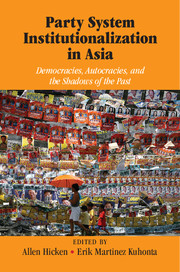Book contents
- Frontmatter
- Dedication
- Contents
- List of Figures
- List of Tables
- List of Contributors
- Acknowledgments
- 1 Introduction: Rethinking Party System Institutionalization in Asia
- 2 The Antidemocratic Potential of Party System Institutionalization: Malaysia as Morality Tale?
- 3 Institutionalized Succession and Hegemonic Party Cohesion in Singapore
- 4 Party System Institutionalization in Japan
- 5 Long in the Making: Taiwan’s Institutionalized Party System
- 6 The Making and Unmaking of the Communist Party and Single-Party System of Vietnam
- 7 The Institutionalization of the Communist Party and the Party System in China
- 8 Party System Institutionalization in India
- 9 Party and Party System Institutionalization in Cambodia
- 10 Explaining Party System Institutionalization in Indonesia
- 11 South Korea’s Weakly Institutionalized Party System
- 12 Thailand’s Feckless Parties and Party System: A Path-Dependent Analysis
- 13 Party and Party System Institutionalization in the Philippines
- 14 Party System Institutionalization: Reflections Based on the Asian Cases
- Index
- References
11 - South Korea’s Weakly Institutionalized Party System
Published online by Cambridge University Press: 18 December 2014
- Frontmatter
- Dedication
- Contents
- List of Figures
- List of Tables
- List of Contributors
- Acknowledgments
- 1 Introduction: Rethinking Party System Institutionalization in Asia
- 2 The Antidemocratic Potential of Party System Institutionalization: Malaysia as Morality Tale?
- 3 Institutionalized Succession and Hegemonic Party Cohesion in Singapore
- 4 Party System Institutionalization in Japan
- 5 Long in the Making: Taiwan’s Institutionalized Party System
- 6 The Making and Unmaking of the Communist Party and Single-Party System of Vietnam
- 7 The Institutionalization of the Communist Party and the Party System in China
- 8 Party System Institutionalization in India
- 9 Party and Party System Institutionalization in Cambodia
- 10 Explaining Party System Institutionalization in Indonesia
- 11 South Korea’s Weakly Institutionalized Party System
- 12 Thailand’s Feckless Parties and Party System: A Path-Dependent Analysis
- 13 Party and Party System Institutionalization in the Philippines
- 14 Party System Institutionalization: Reflections Based on the Asian Cases
- Index
- References
Summary
South Korea is hailed a model of political and economic modernization. A desperately poor country in the immediate post–World War II period, and one that suffered under Japanese colonialism and followed by a war that cemented the split on the peninsula between the North and South, South Korea has emerged to become one of the world’s richest economies. It boasts a diversified industrial economy, having achieved decades of rapid economic growth. And in the late 1980s, Korea began its transformation into a robust democracy, for which a democratic rollback is now virtually inconceivable. Its democracy was won when Korean society mobilized during the mid-1980s in waves of large-scale protests; the military regime responded by capitulating to demands for political change and by introducing real democratic reform almost immediately. Undoing the institutions of the prior military regime has taken time, to be sure, but Korea’s young democracy is deepening: former generals have been prosecuted, industrial barons have been constrained, electoral rules have been institutionalized, civil society remains invigorated and attitudes toward democracy have become more favorable over time. Alternations in power have also occurred regularly, such that the former dominant party, once backed by the military, has experienced and accepted electoral defeat, and opposition candidates and parties have taken power in both the executive and legislative branches of government. The transfer of power between incumbent and challenging parties has by and large been smooth.
These successes notwithstanding, the process of democratic transformation in Korea has not come about without significant challenges that remain today. Chief among these challenges is democratic Korea’s political party system, which by most measures is considered to be weakly institutionalized. For instance, in their article on independent voters in Korea and Taiwan, Alexander Tan and his colleagues calculate that “independents” accounted for 48 percent of eligible Korean voters during the late 1990s, a decade after Korea’s democratic transition was initiated. What is more, the data used in that study were collected during the 1997 presidential election, at the time when perennial opposition candidate Kim Dae-Jung won the presidency, and when most observers noted a deepening partisan divide, at least rhetorically, among “conservative” and “progressive” parties and voters. Even so, despite the supposed ideological polarization of Korean electoral politics, which seemed to portend a more institutionalized party system, nearly half of those surveyed indicated that they do “not lean toward any parties.”
- Type
- Chapter
- Information
- Party System Institutionalization in AsiaDemocracies, Autocracies, and the Shadows of the Past, pp. 260 - 279Publisher: Cambridge University PressPrint publication year: 2014
References
- 12
- Cited by

